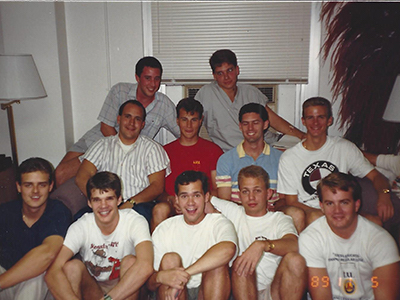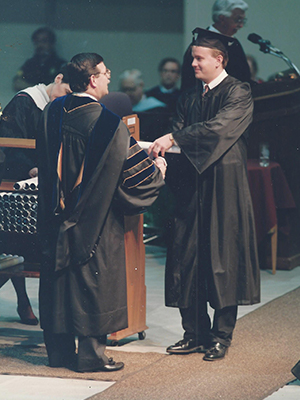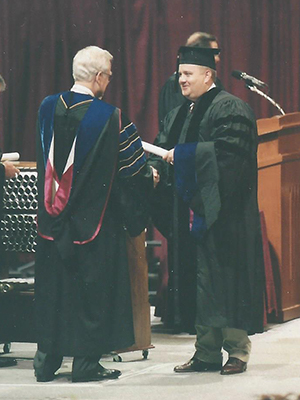
Many students come to Texas A&M University without knowing what their future career will be. Dr. Brian Craig can relate.
Craig wanted to pursue a program that involved engineering, yet was human-centered, not solely focusing on math and design. He found it at Texas A&M, receiving bachelor’s degrees in bioengineering (1990) and industrial engineering (1992), a master’s degree in industrial engineering and a Ph.D. in interdisciplinary engineering.
While he may not have known what to study as a freshman, Craig has achieved great things over his career, including recently becoming the dean of the College of Engineering at Lamar University.
Craig’s success has been built on hard work, responsibility and practicing the Aggie core values in his life and career.
Before the fall semester begins, Craig spoke with us about how he joined the industrial engineering program and how Texas A&M impacted his life.
Q&A

Q. Why did you choose to attend Texas A&M?
A. I was in the first generation of Aggies in my family, preceded by my older brother David. I had opportunities to visit Aggieland and attend Fightin’ Texas Aggie football games while I was in high school. Those visits, along with the core values, made the choice of which university to attend a simple one for me. I did not apply anywhere else.
Q. Why did you choose your majors?
A. As is the case for many entering freshmen, I didn’t have a clear idea of what I wanted to study. Computer science was my initial selection, due to the obvious trajectory of computer applications and technology, but I switched to bioengineering after my freshman year knowing I wanted to pursue a combination of something engineering, yet human-related.
When I graduated with my bachelor’s degree in bioengineering I wanted to go to grad school, but the job market was down. I remained in school and finished my degree in industrial engineering in 1992. It was around that time that I took a course in human factors engineering, a field that, at the time, I did not even know existed. As they say, the rest is history. After almost six years and two degrees, I had finally found something that involved engineering, yet was human-related.
Afterward, I earned a master’s degree in industrial engineering and Ph.D. in interdisciplinary engineering, specializing in human factors engineering, ergonomics and safety. Most of these opportunities I owe to my graduate faculty, particularly my master’s and Ph.D. advisor Dr. Jerome (Jerry) Congleton, professor and director of the National Science Foundation Industry/University Cooperative Research Center in Ergonomics and director emeritus of the Texas A&M Ergonomics Center.

Q. How has being an Aggie engineer helped you in your career?
A. The world-class education you receive by earning an engineering degree from Texas A&M is immediately recognized and respected. Whether I am traveling or walking into a meeting for the first time, I have an instant network. I simply scan the meeting room, or as I am waiting on a flight at the airport, for Aggie rings and more often than not I will see fellow Aggies proudly wearing them.
Particularly early in my career, the engineering education that I earned from Texas A&M provided an increased sense of confidence. However, even as respected as an engineering degree from Texas A&M is, my level of success would not have been possible without my graduate school faculty and a lot of hard work.
Q. What advice would you give to current engineering students?
A. As my father told my brother and me growing up, “Find something you love and hopefully you can also get paid to do it.” This is simple, yet profound, considering the impact your chosen career will have on your overall quality of life and family. A career that you love allows you to wake up each morning and look forward to working.
Believing in something greater than yourself can also lead to a worthwhile and fulfilling career. Texas A&M fosters an environment of collaboration and responsibility. Your classmates expect you to uphold a certain set of values and those values are important to remember and integrate into your life after you graduate and move into your career. As you move up in your career, you need to strive for a balance in life. Work hard but balance that with fun.
The world-class education you receive by earning an engineering degree from Texas A&M is immediately recognized and respected.
Students also shouldn’t lose sight of the fact that they are responsible for their future level of success and shouldn’t be afraid to pursue their dreams. Accept the difficult assignments in college and in your career. When you work you should always have a sense of urgency and be driven so you never have people waiting on you. Balancing this drive with patience, a skill that I still struggle with at times, and having respect for your coworkers, regardless of their title or rank, will allow you to succeed in your school work and future career.
Don’t forget that faculty can be one of your best assets now and into the future. Ask one or more of them to be your mentor.
Try to avoid student debt as much as possible. A lesson that I learned the hard way as I am in my 19th year of repaying my student loans.
Always remember that you really can change the world in some meaningful way with the education that you are currently working on. The hard work and challenges that come with earning an engineering degree from Texas A&M really are worth it. Be persistent.
